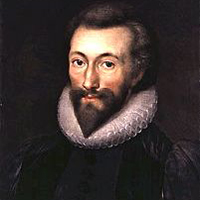The Sun Rising by John Donne: Analysis
The Sun Rising, originally spelled as The Sunne Rising, is a metaphysical love poem by John Donne where the sun is personified as the ‘busy old fool’. It was first published in 1633. As this poem is a metaphysical poem, it is loaded with witty conceits and unbeatable logics of John Donne.

John Donne (1572-1631)
The surface reading of the poem claims that the poem is just the glorious surrender of the joys of the sexual love as the only true reality and the splendid denial of the significance of the outside world. The tone of the speaker is disdainful and criticizing when it comes to address the sun. He perceives the sun as weak, old, and a fool in the first few lines and by the end of the poem, he silently admits its vitality and power in the earth for the survival of living organisms. Though the poet denies the importance of anything outside the lover’s bedroom, the day to day realities of the familiar and ordinary world cannot be denied in the poem. The order given to the sun by the poet to rush the schoolboy, to court the king in his ride and harvesting implies the daily chores that the poet counts except his love.
The speaker goes on focusing his beloved and comparing her to the world’s kings, queens, riches, power and beauty. Donne’s powerful conceit is used in the last stanza where he states,
Thine age asks ease, and since thy duties be, To warm the world, that's done in warming us, Shine here to us, and thou art everywhere: This bed thy center is, these walls, thy sphere.
Here, the poet compares his beloved to the whole world and their bed in the center of the world. By shining on their bed, the sun is supposed to fulfill its duty of warming all the universe. The world has been contracted into the small bedroom of the poet.
In the second stanza, the poet is rude to the sun and says that its beams are not as strong and noble as the power and the glory of their true love. Though his single wink can eclipse the sun, he would not do so, because the view of his beloved might too get eclipsed. Here, John Donne, emphasizes that the sun has no real power in front of the lovers, they can do whatever they like even in the broad daylight challenging the sun its presence. It is he who has let the sun in so as to witness the beauty of his beloved which may dazzle even the sun. The beloved, her beauty and their love have been raised above the level of the sun and the universe.
The poet, moreover, compares her to the wonderful and exotic places of the world: India’s (West and East Indies known for valuable spices and metals), and the states of the world. “All here in one bed lay”, “She’s all states, and all princes I”. The sun travels all these wondrous things of the earth and everything that is precious in the earth is combined in his mistress. So, the sun does not need to go away from the bedroom now, but just shine so that its duty to warm the world is easily fulfilled as she is the world for him. This is the boldest comparison, in other way this is the strongest conceit used in this poem. The world is gradually reduced to the tiny bedroom of the lovers and the ultimate importance is given to the lovers. The existence of the physical world is merely nothing to the lovers. The lovers can go beyond the time and space and make their love immortal.
Cite this Page: MLA Style
Shrestha, Roma. "The Sun Rising by John Donne: Analysis." BachelorandMaster, 06 March. 2018, https://www.bachelorandmaster.com/britishandamericanpoetry/the-sun-rising-analysis.html.
Related Topics
 |
bachelorandmaster.com |